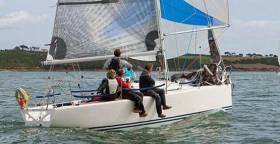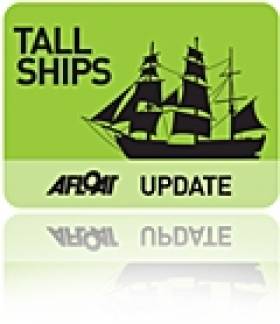Displaying items by tag: sloop
Two Corby 25 IRC Racers For Sale on Afloat.ie
Have you ideas about purchasing the perfect IRC racer with occasional day cruising possibilities? Are you looking at a yacht with an overall length of 25 to 28–ft, to suit a crew of four or five? Are you working off a budget of somewhere between €30–40,000? Maybe you also want the possibility of sleeping on board for a lads weekend with fish and chips for supper? A focus point for your consideration then has to be the Corby 25 which offers so much more potential than a sportsboat. Afloat.ie boats for sale currently has two of these highly successful IRC designs listed for sale.
The Corby 25 is a fast sailing racing boat, it is built and designed to sail with great upwind performance. Corby 25s are typically of GRP hull construction, fitted with a fin keel and bulb and a spade rudder. Due to her relative high weight (2t) 50 % in the keel, the Corby 25 is very stiff, holding all sails up to 20–knots true wind, she reaches an apparent upwind angle of about 17 degrees and therefore has an ability to sail higher than most of her competitors.
These fractional sloops are also fitted with small saildrive inboard diesel engines.
Inside the Corby 25, there are typically four berths: two are under the cockpit and two in the central cabin. One toilet is installed in the front cabin. A flexible water tank is fixed to supply an outside shower with an electric pump. A maritime kitchen (one burner) on gimbals is available in option with an outside gas storage (EU norms).
The first of these listed on Afloat boats for sale is a 2004 version afloat in Cork. At €39,500 she is a previous winner of the ICRA 'Irish Boat of the Year' so has proven speed, according to Boatshed Ireland's Ken Lawless. Full advert here.
The second is a 2000 version an according to seller Liam Burke she is 'not your standard GRP production boat' but custom built by John Corby in the UK from Cedar strip and Epoxy making her lighter and stiffer than the subsequent production models'. At €29,500 this 2000 built boat had a hull respray in 2015. Full advert here.
Irish Yachtsmen Rescued From Stricken Vessel Off Bermuda
#Wolfhound - Four Irish yachtsmen have been rescued from a recently purchased vessel some 70–miles north of Bermuda after it suffered both power and engine failures amid stormy conditions off the northeastern United States.
The 48-foot Swan class sloop Wolfhound, purchased recently by owner/skipper Dalkeyman Alan McGettigan, had departed from Connecticut on 2 February en route to Antigua in the West Indies to compete in the RORC Caribbean 600.
As WM Nixon wrote on Afloat.ie recently, the Wolfhound was expected to eventually call Dun Laoghaire home following its Caribbean adventure.
But according to Bermuda's Bernews website, trouble began when the vessel reportedly suffered a loss of battery power due to the failure of a new inverter charger some 400 miles off the Delaware coast.
This was followed by engine failure a day after departure which left the vessel without communications or navigation systems for eight days.
Between Friday and Saturday the boat reportedly suffered two knockdowns in treacherous weather on the heels of the midwinter storm that recently battered America's northeastern states, and which led McGettigan to activate the on-board emergency beacon.
After a fruitless search by US Coast Guard aircraft, the yachtsmen were eventually located by and transferred to a passing cargo ship, Tetien Trader, which had joined the search effort.
The Wolfhound later sank some 64 miles north of Bermuda.
McGettigan's crew from the Royal Irish Yacht Club in Dun Laoghaire have been confirmed by the club's sailing manager Mark McGibney as Declan Hayes and Morgan Crowe.
Tom Mulligan of the National Yacht Club has been named locally as the fourth crew man on board.
A source close to Afloat.ie says that Hayes telephoned home from the Tetien Trader and confirmed he and the others were being "well looked after" by the Greek crew of the cargo vessel, which is due to land in Gibraltar on 19 February.
A member of the RIYC, Alan McGettigan is an experienced offshore skipper, previously sailing in areas as far afield as the Baltic Sea, the Caribbean, the South China Sea and the Mediterranean, and having competed in past Round Ireland and Dun Laoghaire to Dingle (D2D) races, most recently in the yacht Pride of Dalkey Fuji.
West Cork School Offers Temporary Tall Ship Sloop Solution
"There was fantastic energy at the Tall Ships workshop and while it was agreed that Ireland would benefit tremendously from an iconic square rigger tall sihip, this will take some to bring to fruition.
In the meantime, we are can look to existing Tall Ships operating with Irish Flag to offer the great experience that Sail Training can offer. Rohan MacAllister, previously captain of Asgard II for 10 years attended the meeting with Gail & Niall MacAllister of West Cork Sailing Centre to present Cypraea as a marvelous tall ship sailing sloop that is equipped to provide sail training on our Irish waters this summer.
The attendees of the meeting congratulated the MacAllisters on their tenacity and determination in bringing their sail training vessel to our waters and making the "Sail Training Experience" accessable for teenagers and adults this summer by dedicating July to Teenage Sail Training 5 day adventure sails for 350 euro and August to Adults at 450 euro.
Cypraea is a 23.5m steel sloop with berths for 10 at present and plans to increase to 16. She has three sails and is an extremely hands on team work sailing experience.
West Cork Sailing have been providing ISA and RYA sailing for many years and are excited to be providing Sail Training and the amazing life changing opportunity that it can bring".
Looking for further reading on Tall Ships in Ireland? Click the links below:
Click this link to read all our Tall Ships Stories on one handy page
Previewing Ireland's Tall Ships 2011 Season
Can Ireland Get a New Tall Ship?































































